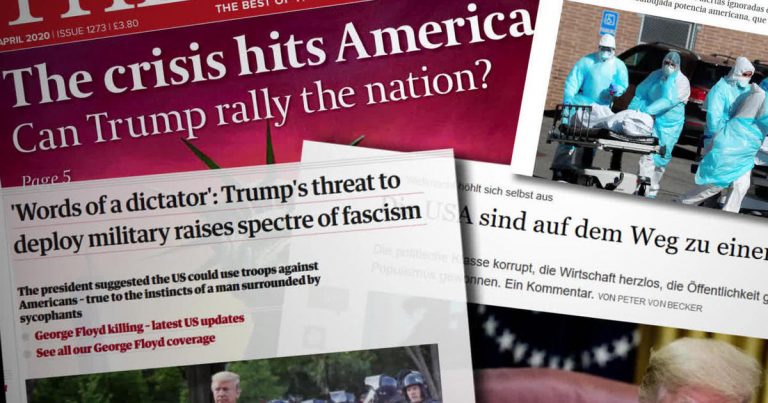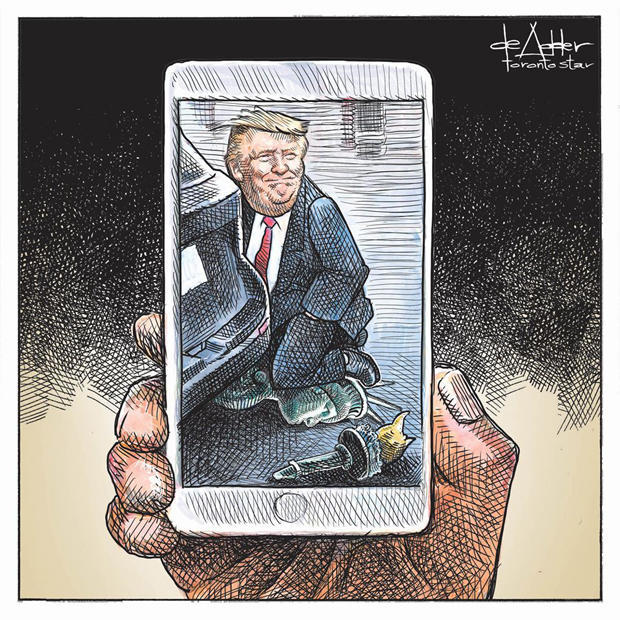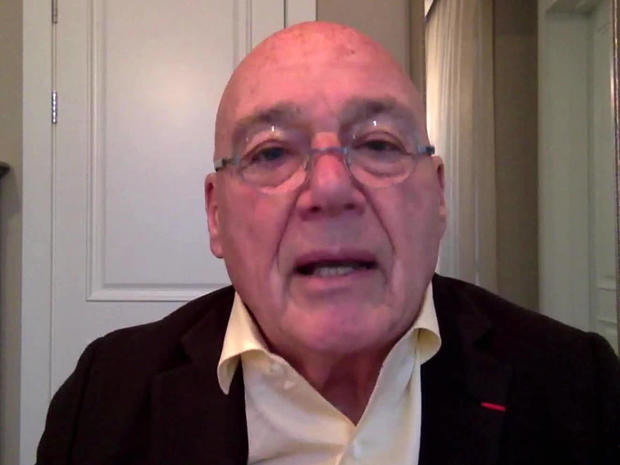
“Civil unrest is erupting in cities across the United States…”
Liu Xin is identified as a host and journalist at the state-run China Global Television Network. Focus on the “state-run” part and you will appreciate that the “journalist” description needs to be taken with a grain of salt.
Let the record show, however, that Liu Xin is very, very good at what she does. And what she does, in flawless English, is reflect the official Chinese view of the United States.
CGTN
She told “Sunday Morning” special contributor Ted Koppel, “If you go on the social media there are a lotta people who are asking, ‘What is it about American democracy and freedom? You think that you are the beacon of the free world? And yet when it comes to a lot of the issues that we are seeing now, it seems that there is a great degree of hypocrisy.'”
“When you speak of the perceived hypocrisy, what do you mean?” Koppel asked.
“They talk about everybody having the right to be equal, that people should be free, all of these democratic values that the United States have been promoting around the world. And yet, when it comes to human rights, when it comes to protecting people’s lives, protecting people’s health, it seems that it is not #1 when it comes to protecting the lives of the American people.”
Koppel notes, it’s a little irritating to be lectured on human rights and the sanctity of life by a Chinese government representative – but the United States government was late in recognizing the enormous threat posed by the coronavirus, and the U.S. does have one of the highest pandemic death rates in the world.
Now, since a little more than a week ago, here and overseas there’s been the mounting public outrage over the police killing of George Floyd. Sometimes, what we treat as separate crises, our friends and adversaries overseas view as part of an overall pattern, often with one common thread: Donald Trump.
A recent political cartoon from China’s CGTN focused on the pandemic: Mr. Trump preparing to inject a critically-ill Uncle Sam with a giant hypodermic labeled “Blame China.”
CGTN
It’s in harmony with a growing chorus of bristling resentment among America’s oldest friends and allies. Take this image of President Trump with his knee on Lady Liberty’s neck, which ran in the Toronto Star.
Michael De Adder, The Toronto Star
“He personifies in some ways what people are sort of looking at and saying, ‘You know, what’s happening to the United States that we thought we knew?'” said Zanny Minton Beddoes, editor-in-chief of the British news magazine The Economist (which actually has a wider readership in the U.S. than in Great Britain).
The British view of the United States? “They see a country that is no longer interested in playing the global leadership role, that is having very angry, combative relationship with the world’s second-biggest economy, and it’s one that is increasingly unpredictable.
CBS News
“And this is largely during this administration – unpredictable in terms of, you know, which international agreement is the Trump administration going to leave next?”
It’s a long list, and growing longer: the Iran nuclear deal, the Paris climate agreement, the Open Skies treaty, the World Health Organization …
Bernard-Henri Lévy (who is what the French like to call a public intellectual) said, “In the past, the world expected something from America: Expected a reaction, a retaliation, a move for the good, a move not for the bad also.
“America was a force on the world. Today? No. The shining city up on a hill is barricaded inside its borders, looking inside of itself, and turning its back to the rest of the world.”
Koppel also asked Jorge Castañeda, who was Mexico’s Secretary of Foreign Affairs in the early 2000s, “Is there a feeling in Mexico that America has changed?”
“I think people in Mexico are seeing a United States that is less powerful, less prosperous, less effective in dealing with a very serious challenge than people in Mexico might have thought as early as six months ago, a year ago.
CBS News
“It’s not going to be easy for other countries – whether they be the wealthy ones or the poor ones, or the very large and powerful countries like China, like India – to easily accept American leadership, or to trust the United States again in terms of the way that Chancellor Angela Merkel has put it in Germany: ‘Are we Germans going to put our security in the hands of people that we can no longer trust?'”
That trust, Castañeda said, “is gonna be difficult to recover.”
In 1980, when much of the world depended on U.S. security guarantees, the Soviets had just invaded Afghanistan. Vladimir Pozner, in Moscow, made the first of what would be many appearances on ABC News’ “Nightline” as a Radio Moscow commentator. He was an effective apologist for the Kremlin. These days, still based in Moscow, Pozner is an independent voice with a highly-popular national television program on public affairs.
Koppel asked, “You talk to a lot of the thinkers and policy makers in Russia. If you were to synthesize their attitude toward the United States and how it has changed over the last few years, what would you say?”
CBS News
“It’s kind of lost its idealism that was so important to the rest of the world, and to this country, especially to those who wanted freedom,” Pozner replied. “Back in the days when you and I used to speak to dissidents, and you know, the generation that followed, there was a feeling that somehow America has gotten off the track that made it America and made it so attractive to the rest of the world.”
The Economist’s Zanny Minton Beddoes has similar concerns: “I think the view of the United States has changed quite sharply in the era of President Trump,” she said.
Her magazine has an affiliated research unit that grades nations according to the quality of their democracy. In 2016 it downgraded the United States to the level of a “flawed democracy” [due to, it reported, “a further erosion of trust in government and elected officials”].
“I spent, you know, 20 years living in the U.S., my kids have American passports. I love America,” Beddoes said. “But I find when I go there now, the sort of degree to which it is an angry, unhappy and polarized country now is really extraordinary.
“I watch MSNBC in the morning and Fox in the evening and, frankly, you could literally be in a different country!”
Vladimir Pozner also lived in the United States for many years. He notes that today, “Russians kind of say, ‘What’s going on there?'”
Koppel asked, “Is there a sense that America’s time as the dominant country in the world is, if not over, at least nearing an end?”
“Definitely, there is that kind of feeling, and that probably the next #1 is going to be China,” Pozner replied. “And there’s not much you can do about that. I think there is definitely a feeling that the American century has passed.”
“Well, what a bummer!” laughed Koppel.
“I wish it weren’t so, I’ll tell you that.”
Because? “Because it’s a country I care about very deeply, goddammit!” Pozner said.
There are still those who believe that America’s best days are not in the past. Bernard-Henri Lévy is definitely not ready to give up on the United States:
CBS News
“No, no, the values of America are still there, embodied by real women and men, embodied by institutions. And I’d even say my prediction since the beginning is that the time of Donald Trump will be shorter than his supporters believe. Because the real wall is not the wall between America and Mexico; the real wall is a wall of civil society in America, the wall of American women, the wall of Americans who are revolted when black citizens, an African American citizen, is killed in cold blood by crazy and murderer policemen. There is such a big part of America who is revolted by that. So, America is still alive.”
History teaches us that all great powers are ultimately replaced. And one day, inevitably, it will be America’s turn. What our friend Bernard-Henri Lévy seems to be saying is, “True, but … not yet.”
For more info:
Story produced by Deirdre Cohen and Dustin Stephens. Editor: Steven Tyler.





